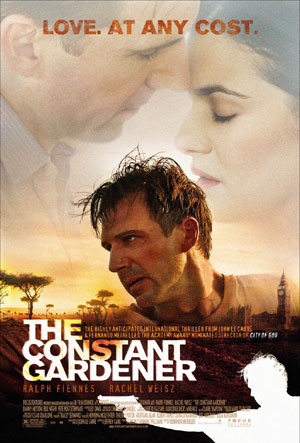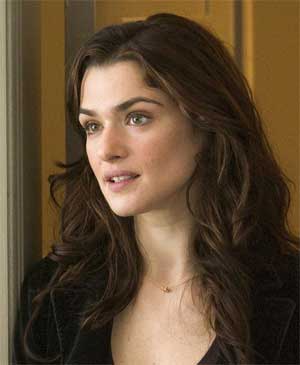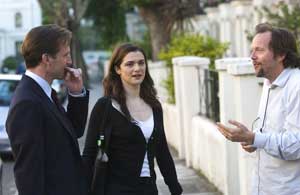 In The Constant Gardener, based on the novel by John LeCarre, Rachel Weisz plays Tess, a radical activist who falls in love with Ralph Fiennes’ buttoned-up diplomat. Together they head to Africa, and while there she uncovers a vast conspiracy between governments and the pharmaceutical industry, with poor and sick Africans as the victims.
In The Constant Gardener, based on the novel by John LeCarre, Rachel Weisz plays Tess, a radical activist who falls in love with Ralph Fiennes’ buttoned-up diplomat. Together they head to Africa, and while there she uncovers a vast conspiracy between governments and the pharmaceutical industry, with poor and sick Africans as the victims.
Directed by Fernando Meirelles, who helmed City of God, The Constant Gardener is filled with gorgeous photography, but it doesn’t take a genius cinematographer to make Weisz look good. I first met her back at the San Diego Comic Con, where she and her boyfriend Darren Aronofsky hosted a cocktail party for their upcoming (and insanely anticipated) film The Fountain. A couple of weeks back I had a chance to sit down with her here in New York City to talk about The Constant Gardener, which opens today.
Q: Were you on this picture with the previous director?
Weisz: No. It was Mike Newell and Ralph, and then Fernando came aboard and I read the script at that point.
Q: Was it Fernando that got you interested? Did you want to work with him?
Weisz: It was a kind of glorious combination of story, character, script, director and lead actor. Obviously I had seen City of God – it’s just such an extraordinary piece of work that I wanted to work with Fernando. I was actually in LA, working, when I read the script. Fernando was in London and he wasn’t really familiar with any British actresses. I read the script and I got on a plane – I had a day off and I managed to fly to London and back in 24. I met him for an hour and took a plane back. I am just telling you to signify how much I wanted to do it! I wrote him a very passionate letter telling him I wanted to work with him. I really wanted this role.
Q: What was it about the character that spoke to you?
Weisz: I’ve always been fascinated by people who will devote their life to helping other people. People who will go to Africa or to India and work in the field and help people and even put their own life in danger to do what they believe is right. I’ve always been in awe of people who will devote their life to doing that. What makes them tick, what makes them so driven? What do I do for a living – I tell stories. I’m an entertainer. My job is nothing like that. So I had to put myself in the skin of somebody who was like that, and that was what really appealed to me about her – she’s someone who believes that one person can make a difference. Or that even helping one person can make a difference. I believe that’s a very optimistic and beautiful outlook.
Q: Did you become more like her? Did you find yourself changing your views?
Weisz: Africa changed everybody. Not just me, every single member of the crew was deeply affected by what we saw. In the slum of Kabira we saw a level of poverty that I don’t think anyone had seen before.  There’s a million people living in a very small space with no running water, no electricity, no sanitation, with a very high level of disease and HIV. And yet these people’s spirit was so powerful and warm and hospitable. They welcomed us. There’s a scene in the movie where the children all say, ‘How are you? How are you?’ and that’s what happened. That wasn’t in the script, they weren’t directed, they weren’t extras.
There’s a million people living in a very small space with no running water, no electricity, no sanitation, with a very high level of disease and HIV. And yet these people’s spirit was so powerful and warm and hospitable. They welcomed us. There’s a scene in the movie where the children all say, ‘How are you? How are you?’ and that’s what happened. That wasn’t in the script, they weren’t directed, they weren’t extras.
So everyone was deeply affected. I think it’s all very well to be deeply affected, but that doesn’t really help anybody. So what we did was set up a charity which is the Constant Gardener charitable trust. We’re going to be fundraising. We’re going to be building a secondary school in the north, and we built a school in the slum, and we built a bridge. There will be ongoing fundraising events.
Q: What was it that changed in you when you saw all this?
Weisz: Before we went to the slum we all thought, ‘Oh my god, we’re going to feel so sorry for these people, they’re so poor,’ but as I said the children welcomed us. And the adults were very generous and very open. The parents said to me ‘Where you live, do the children welcome strangers?’ I said, ‘Where I live, children are told not to speak to strangers,’ and they couldn’t understand it. You began to realize that there was a great material poverty, but there was a great spiritual love. We come from a culture where you think, ‘Oh that’s a nice handbag. Maybe if I buy that handbag I’ll feel better,’ and you start to realize the nonsense of materialism in our lives.
Q: Your character, as you said, is someone who will do anything to help people. Is it possible that her first attraction to Ralph’s character was as a way to get to Africa?
Weisz: No. What I love about this film is that it’s a thriller. It’s a fun, entertaining, action packed political thriller. But it’s also a love story. It’s a love story that’s very, very original. You know the saying of opposites attract – our characters are complete opposites. My character is volatile, passionate, she likes to rock the boat, is a troublemaker. Ralph’s character is reserved, very British, he doesn’t like to show any emotion. He becomes her rock, he provides her with stability. I think she probably adds some color and passion to his life. I believe it is a big, big love story and they love each other very deeply.
Q: What do you think it is about Tess that makes her be so willing to keep trying to help people, no matter how hopeless it seems?
Weisz: This is what I was really in awe of about her. There are people like her, individuals who believe that just the one drop in the ocean can make a difference. Nothing was going to deter her from that. I guess you’re either like that or not. I don’t know if you can grow into being one of those people. She’s a better girl than I. She believes you can make a difference. It’s a beautiful thing.
Q: This film centers on the all-too true abuses perpetrated by the pharmaceutical companies. Were you aware of the way big pharma works coming in? Was that a plus for you with the project, or did you learn about it here?
Weisz: What I like about the movie is that it’s a political thriller, it’s a love story and it also touches on subjects that are very, very hot topics right now. Very current topics that are in the papers and on the news. The media’s paying a lot of attention to pharmaceutical companies. I think it’s a smart thriller, and I hope it will continue the debate that is raging right now.
Q: What can you tell us about The Fountain?
Weisz: It’s set in three time zones. It’s set in 16th century Spain, it’s set in present-day America and it’s set in the future in space.
Q: And in the future scenes there’s this big tree.
Weisz: On board the space ship there’s the Tree of Life. The Fountain refers to the search for the search for the fountain of youth. It’s a love story in which I star opposite Hugh Jackman, and we are lovers in each time period.
for the fountain of youth. It’s a love story in which I star opposite Hugh Jackman, and we are lovers in each time period.
Q: Is that all you can say? What was it like being around that actual tree?
Weisz: It was beautiful. It was one of the most beautiful sets I had ever seen. It’s a space ship – I don’t know if I can give any more away than that!
Q: How did you like working improvisationally?
Weisz: Loved it. I love improvising. And luckily so does Ralph. Some actors, and that’s absolutely fair enough, don’t like to improvise. They like to do pretty much the same thing each take and then perfect the take as they go, which is a very valid way of working. But Ralph and I both love to improvise, and that was very much encouraged by Fernando. In City of God he worked mainly with non-actors, so he’s used to people being spontaneous and free and messy. Real life is kind of messy and chaotic. We were allowed to try things and stray from the text and be raw and real with each other. I love improvising, it’s one of my favorite things to do.
Q: How did you prepare to play Tess?
Weisz: When I was in London OxFam was very generous. They introduced me to activists, people who worked in the field, and they told me stories. It’s a bit like your job, asking people questions. But the real inspiration came in Africa. When I met the people of Africa, that’s when my heart became really full with this character. Also there was one woman in particular, a Kenyan activist who has been living with HIV for the last twelve years, and she went round the slum counseling women who were HIV sufferers, and she allowed me to go round with her on these visits. That was a tremendous privilege, because I could really then experience the kind of thing my character would experience. It was meeting these women and children, the people of Africa, that really inspired me.